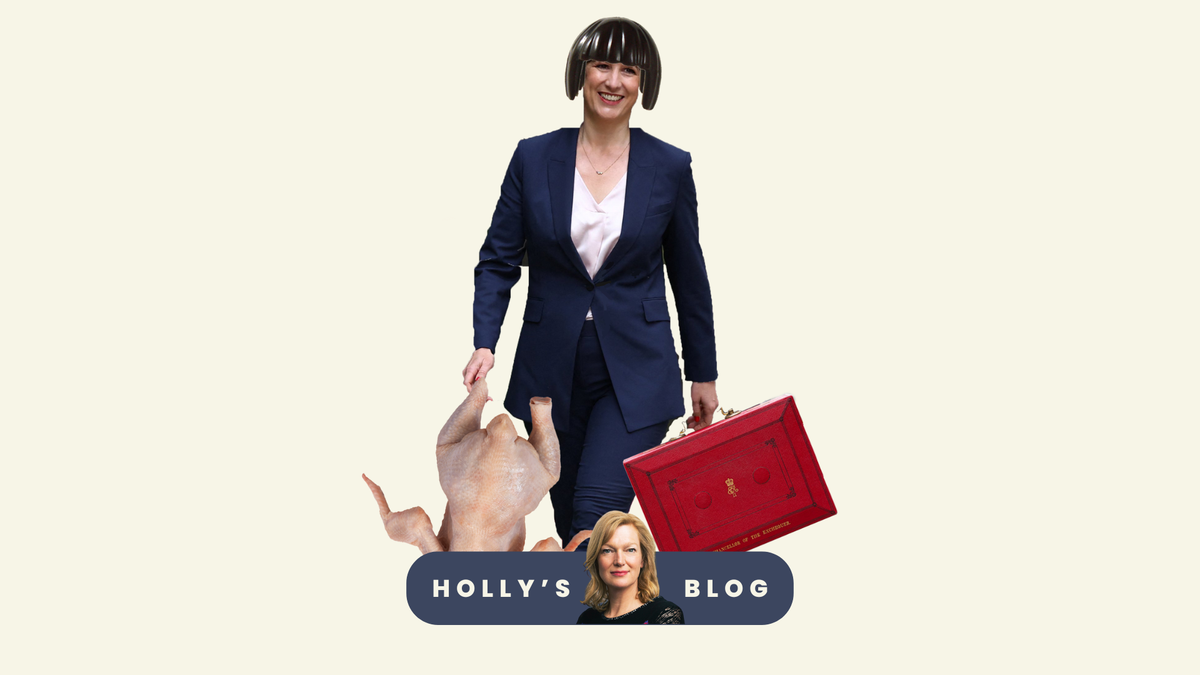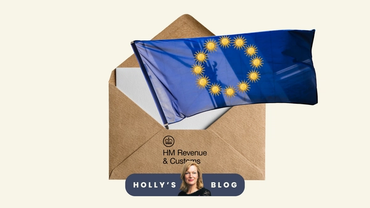Have you been royally plucked?
By Holly Mackay, Founder & CEO
1 Nov, 2024

Today’s blog picks out the key impact for consumers and readers but, first, I’ll start with my 200 word Budget Summary for those with a very low boredom threshold, before diving into the detail. We are asking our readers to share your delight, rage or indifference to the Budget in a quick poll which we will summarise and share with you next week.
In a nutshell – The summary
Rachel Reeves spent 13 minutes reminding us how rubbish the Tories were. So uncontentious that this could have been done in 13 seconds. Meanwhile, Rishi Sunak was on his phone buying new sliders for Barbados and didn’t even look up for her pointed joke about private jets.
The Chancellor then talked about black holes more than Stephen Hawking did in his entire life, before announcing bad news for small business owners who like smoking roll-ups and drinking spirits on private planes whilst flying to a second home in a non-dommy country, shouting at their privately educated children and chatting to an elderly parent who has built up a chunky pension to leave them. Farmers have been royally plucked.
Needing to dribble in elements of cheer, she announced good news (or ‘less bad’ news) for those on the minimum wage and often neglected carers. There was relief for those who were worried about Income Tax thresholds being frozen past 2028 and people who had worried about their tax-free cash in pensions. And people who charge around the country a lot in cars whilst drinking draft beer (not at the same time people, although the prisons are full, so you might be OK).
Right, to the detail. First, Capital Gains Tax
Basic-rate taxpayers will now pay 18% (up from 10%) on gains made when they sell shares (not in an ISA or pension), any second property, or other assets. The rate has gone up to 24% (from 20%) for higher rate taxpayers.
What can you do? We still have an allowance of £3,000 a year – so you could sell some shares before the end of the tax year next April, make this much profit and then sell some more on the 6th April (realising up to another £3,000 profit). And not pay any Capital Gains Tax (CGT). Or, if you have any shockers which have lost you money and appear in red on your investment app, you could consider selling these and using the losses you incur to offset any gains.
You can also transfer any shares you have outside an ISA, into an ISA, up to the ISA contribution limit of £20,000 a year. So getting as much into the tax quarantine that is an ISA as you possibly can. This is called ‘Bed and ISA’ and you can read more here.
You could consider giving assets to a spouse if they are not an investor, so that they can also use their annual allowance, although if they don’t like you very much, be aware that they may run away to Barbados with the dosh. Or can you lower your taxable income this year (pension contributions are one way of doing this), so that you're a basic-rate taxpayer for example, so pay the lower CGT rate?
Second, Inheritance Tax
This is always confusing. Here are the headlines of what has changed.
Pensions will now be part of your estate from an inheritance perspective. To reply to a reader, this isn’t for a spouse or civil partner by the way – you can still leave them your pension (and everything) free from Inheritance Tax (IHT).
You don’t have to pay IHT on assets up to £325,000 (cash, cars, property, shares, life insurance payouts etc.) and a further £175,000 if you’re leaving your home to the kids or grandkids (and your total estate is less than £2m). So that’s up to £500,000 per person. Or £1 million per couple.
People used to keep as much money as possible in pensions, for as long as possible, and spend things like ISAs first, to leave money to the kids that wouldn’t be taxed. That way of doing things is no longer relevant.
What can you do? One furious reader told me he might try and die before 6 April 2027, when this changes. I hope his fury has abated a little today - that’s very extreme tax planning. A better outcome is gifting which will surely become part of many more family conversations. I think it’s very hard for older people – particularly those with farms – to prematurely lose their financial independence after a life of graft, and gift to their children, and then rely on them financially. But it’s an inevitable response.
What can people who are normal families and not tax-dodging oligarchs do? You can give up to £3,000 away each year. You can also give away ‘surplus income’ – you need to pay it from your regular monthly income and be able to evidence that you can afford these payments after your usual monthly costs.
If you give a lump sum of more than this, the gift will fall out of your estate after seven years have passed. So not only do you give this away, but you then need to drink kale juice, give up the fags and join a gym for seven years to beat the tax man.
Third, National Insurance and wages
Employers will have to pay more. National Insurance goes from 13.8% to 15%. But more importantly, employers will have to pay this on every salary £ per employee above £5,000 a year from April next year, not the £9,100 it is today.
By way of an example, someone on £35,000 a year will cost their employer £926 more each year from April. Someone on £60,000 will cost an extra £1,226 a year. These are not small amounts when you consider a firm with say 50 or 100 employees.
It’s hard to see how this won’t impact employees. Employers have already set their budgets for 2025. They now have to find more money. So they either take lower profits, increase their prices, lay off some people, or don’t give any pay rises.
Fourth, mortgages and property
Bad news for the housing market. Mortgage rates will probably go up, the stamp duty holiday for first-time buyers was not extended, so will end in March, and stamp duty surcharge on second homes was raised from 3% to 5%.
The average interest on mortgages today is roughly around 4.5% for a 2-year fix. It’s expected to nudge up a little over the coming weeks and months. About one-third of mortgage holders are going to have to remortgage in 2025. If this is you, I see no harm in getting an offer 6 months in advance to hedge your bets, sitting on it for a few months and seeing what happens before you commit to anything.
To understand mortgage rates, we have to look at bond and gilt markets. Nooo, you might wail. Come on – I’ll make it quick.
Bonds are IOUs issued by governments or companies. Gilts are IOUs from the British Government, used to borrow money to fund their plans. We get interest in return (‘yields’) and also hope that the price of these bonds goes up a bit too.
During the budget, gilt traders were too busy wondering if Reeves’ hair every actually moves to have a reaction, but on Thursday they woke up and longer-term gilt yields rose. They're above 4.5% for the first time in a year.
Why? The Chancellor announced plans to spend (and borrow) a shed load of money on things like schools and the NHS. The markets think the amounts are a bit dicey and that economic growth will be feeble. So, they're asking for higher interest rates in return, to compensate them for the perceived risk. And because we're seen as a bit of a dodgy bet, yields are up, money is more expensive to borrow and this impacts mortgages.
As for landlords, changes to stamp duty will now mean people buying second homes will pay more – for example a £350,000 property will now incur £7,000 more in stamp duty.
Fifth, Pensions
None of the cataclysmic changes some thought we might see to contributions, tax relief or indeed tax-free cash. The big bombshell related to inheritance which we’ve covered above.
If you did get the heebie-jeebies pre Budget and take out tax-free cash and are now regretting it, what can you do? There are some very strict rules about this and so-called ‘recycling’ which we explain here, so don’t get burned.
And sixth, a note for small business owners
Ouch. The good news is that anyone selling a business still gets a lifetime limit of £1 million of ‘Business Asset Disposal’ relief. The bad news is that the tax business owners pay under this relief will nearly double between now and April 2026. Business Asset Disposal relief means CGT on the sale (levied at 10% today) will rise to 14% from 5 April 2025 and 18% from 5 April 2026. The Government very kindly said they were giving business owners a few years to adjust. But I’m not quite sure what there is to adjust to. You're kinda all in. Or all out! And moving forward I think more entrepreneurs will be all out as the lower potential rewards make it harder to justify all the risks.
Silver linings
I fear I have been gloomy. Let’s find some better news. The minimum wage is up. Carers get a less punitive deal if they manage to eke out time to work too. Fuel duty has been frozen for another year. Income Tax thresholds will not be frozen after 2028, so the relentless increase in tax we all pay should ease from 2028 (although call me cynical, but there is a lot of time between now and 2028 to say, “Oops, sorry, changed me mind”).
Phew. That is my round-up. But I’m really keen to know what you guys think. Fuming? Pleased? Bored? Please take 5 minutes to add your voice to our reader poll and we’ll feed back next week about what you like. And hate. I’m afraid next week’s blog might be another blockbuster. Wall St is having a wobble, led by the tech giants, there’s Kemi vs Robert on Saturday and Kamala vs Donald next Tuesday.
If Donald Trump wins, notwithstanding the recent hikes to Stamp Duty for second homes, would anyone else like to join me in buying a small remote island with no Wi-Fi and lots of gin somewhere in the Outer Hebrides?
Have a good weekend everyone,
Holly

Want to get Holly's weekly blog straight to your inbox?
Already have an account? Login






